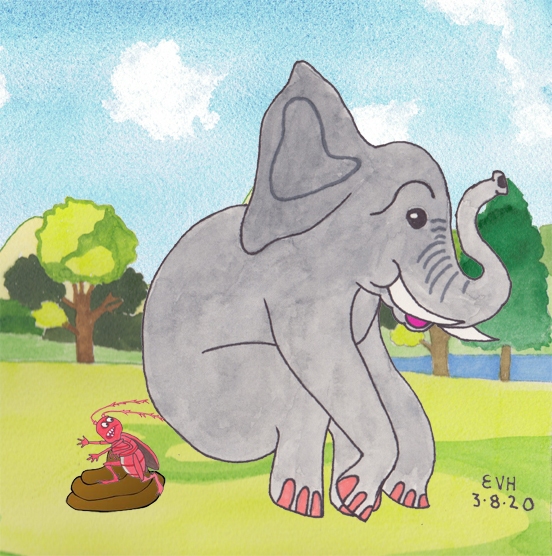
Jataka 227
Gūtha Pāṇa Jātaka
The Dung Beetle
as told by Eric Van Horn
originally translated by William Henry Denham Rouse, Cambridge University
originally edited by Professor Edward Byles Cowell, Cambridge University
It is a little unseemly that a Buddhist monk should beat a misbehaving layperson, but I suppose that stranger things have happened!
“Well matched.” The Master told this story while he was at Jetavana. It is about one of the monks.
There stood at that time, about three-quarters of a league (about 3 miles or 5 kilometers) from Jetavana, a market town. In that town families were issued tickets (ration coupons) that said how much food should be given to them. A great deal of rice as well as special meals were distributed in this way.
In that town there lived a bumbling, annoying lout who pestered the monks who came to share in the distribution. “Who is here for solid food? Who is here for drink? Who is here for moist food?” And he made those who could not answer feel ashamed. They dreaded him so much that they stopped going to the village.
One day, a monk went to the ticket distribution hall. He asked, “Is there any food for distribution in this village, sir?”
“Yes, friend,” was the answer, “but there’s a bumbling, annoying lout there asking questions. If you can’t answer them, he abuses and reviles you. He is such a pest that nobody will go near the place.”
“Sir,” said the monk, “give me a ticket and tell me where to go. I will humble him and put him in his place. I will make it so that whenever he sees you after this, he will just want to run away.”
The man agreed and gave the necessary ticket. The monk walked to our village and he put on his robe at the gate. The lout saw him. He ran at him like a mad ram yelling “Answer me a question, brother!” The monk replied, “Layman, let me go to the village first for my broth. Then I will come back to the waiting hall.”
When the monk returned with his meal, the man repeated his question. The brother answered, “First let me finish my broth, sweep the room, and fetch my ticket’s worth of rice.” He went and got the rice. Then placing his bowl in this very man’s hands and said, “Come, now I will answer your question.”
Then the monk led him outside the village. He folded his outer robe and put it on his shoulder. Taking the bowl from the man, he stood waiting for him to begin. The man said, “Brother, answer me one question.” “Very well, I will,” said the monk, and with one blow he knocked him to the ground, bruised his eyes, beat him, dropped excrement on his face, and then left. He went off with these parting words to frighten him, “If you ever again ask a question of any monk who comes to this village, I will see about it!”
After this the man took to his heels at the mere sight of a monk.
By and bye all this became known among the Saṇgha. One day they were talking about it in the Dharma Hall. “Friend, I hear that a monk dropped excrement in the face of that loafer and then left him!” The Master came in and wanted to know what they were discussing. They told him. He said, “Monks, this is not the first time this brother attacked this man with excrement. He did just the same before.” Then he told them this story from the past.
Once upon a time, those citizens of the kingdoms of Aṅga and Magadha who were traveling from one land to the other used to stay in a house on the road between the two kingdoms. There they drank liquor and ate fish. Early in the morning they yoked their carts and went on their way.
After they left, a certain dung-beetle, led by the odor of dung, went to the place where they had been. He saw some liquor on the ground. Because he was thirsty, he drank it, and then he returned to his lump of dung intoxicated.
When he climbed up on the wet dung it gave way a little. “The world cannot hear my weight!” he cried out. At that very moment an elephant came to that spot. When he smelled the dung he backed off in disgust. The beetle saw this. “That creature,” he thought, “is afraid of me. See how he runs away! I must fight with him!” and so he challenged him in the first stanza:
“Well matched! For we are heroes both. Here let us combat try,
Turn back, turn back, friend elephant! Why would you fear and fly?
Let Magadha and Aṅga see how great our bravery!”
The elephant listened. He heard the voice. Then he turned back towards the beetle and said the second stanza by way of rebuke:
“It is not the foot, the trunk or hand, no teeth that I shall use
Of the dunghill, to the care of dung, it is that I shall choose.”
And so, dropping a great piece of dung on him and urinating, he killed him then and there. Then he scampered off into the forest, trumpeting his success.

Figure: The Ill-fated Dung Beetle
When this discourse ended, the Master identified the birth: “In those days this lout was the dung-beetle, the monk in question was the elephant, and I was a tree sprite who saw it all from that clump of trees.”
